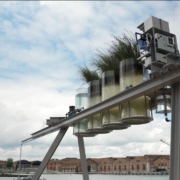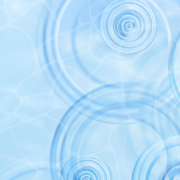19th International Architecture Exhibition: From Venice, a Global Call on the Future of Water
via We Build Value (https://www.webuildvalue.com/en/reportage/biennale-desalination-plant.html)
Webuild supports the ‘Canal Café’ special project, which involves installing a desalination and water filtration system that transforms seawater into fresh water through reverse osmosis — the same solution used to combat water scarcity in many parts of the world
The Venice Architecture Biennale becomes an opportunity to raise awareness in the world of architecture and engineering about the water crisis and the role of desalination plants as a response to global water scarcity.
At the event, curated by Carlo Ratti, Director of the Senseable City Lab at MIT in Boston, the Webuild Group also made its contribution, aiming to address this year’s theme: intelligence in its three forms—human, artificial, and natural.
The event was thus an opportunity to present to the international public an installation awarded the “Golden Lion” for best participation by the Biennale, delivering a message on water treatment and reuse: a system that uses some of the same technologies as large-scale desalination plants, such as reverse osmosis, to treat the water from the Venice Lagoon for an unexpected purpose—making coffee.
The small plant in Venice powers the “Canal Café,” a special project inaugurated during the 19th International Architecture Exhibition (May 10 – November 23). At this café, the beverage is made using water from the Lagoon, only after it has been desalinated, purified, and filtered.
The initiative, supported by the Webuild Group, is curated by Carlo Ratti and designed by the Diller Scofidio + Renfro studio in collaboration with Natural Systems Utilities, SODAI, Aaron Betsky, and internationally renowned chef Davide Oldani.
The project’s implementation, made possible through the expertise of the Webuild Group and its subsidiary Fisia Italimpianti—which, through its desalination plants, currently provides enough drinking water for over 20 million people—is a demonstration of how environmental challenges like water scarcity can be transformed into everyday opportunities.
Choosing to present a desalination and water filtration system at an international event dedicated to architecture and engineering aims to raise public and institutional awareness of the critical importance of water and the role desalination plants could play in addressing the increasingly dire issue of water crisis.
Not Only Venice Biennale: The World Chooses Desalination Plants Against the Water Crisis
From the Arabian Peninsula to Spain, from Israel to India and Australia, more and more countries are turning to desalination plants as water infrastructures to ensure steady supplies of drinking water by harnessing an almost inexhaustible resource: the seawater.
In Australia, the city of Melbourne receives 150 billion liters of water each year (30% of its total demand) from the Victorian Desalination Plant, located 84 kilometers from the city.
This major Australian facility was inspired by infrastructure developed in the United Arab Emirates and Saudi Arabia, to which Webuild’s subsidiary Fisia Italimpianti contributed. One example is the Jebel Ali Desalination Plant in Dubai, equipped with eight desalination units (still among the largest in the world), each capable of producing 80,000 cubic meters of fresh water per day.
In Saudi Arabia, the Ras Al Khair plant supplies part of the drinking water required by the capital Riyadh, with water transported through a 535-kilometer-long pipeline network; the expansion of the Shoaiba III project (which also involved Fisia Italimpianti) led to a facility capable of producing 250,000 cubic meters of fresh water per day, supplying 1 million residents across Mecca, Jeddah, and Taif with potable water.
Italy, Water Scarcity, and the Response Entrusted to Desalination Plants
Despite evident issues related to water scarcity, Italy remains far behind in finding an effective, long-term solution. Currently, there are only 340 small-scale desalination plants operating in the country, accounting for just 0.1% of the national fresh water withdrawal, most of which serve the industrial sector.
The National Recovery and Resilience Plan (PNRR) has allocated €4.3 billion for water infrastructure, but to date, there is still no specific plan for constructing new water desalination systems. This, despite the water scarcity becoming more and more severe. According to ISTAT, between 2001 and 2020, the duration of drought periods in Italy increased by 34% compared to the 1961–1990 period.
This trend has continued over the past five years, especially affecting southern regions, where some areas have experienced severe water crises. Such was the case in Sicilian cities like Agrigento, Catania, and Trapani, as well as parts of Calabria, where a state of emergency was declared.
The construction of new desalination plants capable of transforming seawater into potable water would offer a decisive response to water shortages—just as it has in many other countries around the world that have adopted this technology.

